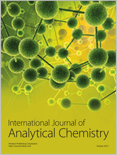
International Journal of Analytical Chemistry
Scope & Guideline
Connecting Researchers to the Future of Analytical Chemistry
Introduction
Aims and Scopes
- Method Development and Validation:
The journal publishes research on the development of new analytical methods and their validation, emphasizing the importance of reproducibility and reliability in analytical chemistry. - Environmental and Food Safety Analysis:
Research addressing the detection and quantification of pollutants, pesticides, and heavy metals in environmental samples and food products, highlighting public health implications. - Pharmaceutical Analysis and Pharmacokinetics:
Studies focusing on the analysis of pharmaceutical compounds, their metabolites, and pharmacokinetic properties in biological samples, contributing to drug development and therapeutic monitoring. - Nanomaterials and Green Chemistry:
Exploration of nanomaterials for enhanced analytical applications and the adoption of green chemistry principles to minimize environmental impact. - Biochemical and Clinical Applications:
The journal features studies that apply analytical techniques to biochemical and clinical settings, including diagnostics and monitoring of diseases. - Chemometric Techniques:
Research involving the application of chemometric methods for data analysis, facilitating the interpretation of complex datasets in analytical chemistry.
Trending and Emerging
- Green Analytical Chemistry:
A marked increase in studies promoting environmentally friendly methods and materials in analytical procedures, emphasizing sustainable practices in the field. - Advanced Nanotechnology Applications:
A rising trend towards the use of nanotechnology in analytical methods, including the development of novel nanomaterials for enhanced sensitivity and selectivity in detection. - Multi-Component and Simultaneous Analysis:
Growing interest in methodologies that allow for the simultaneous analysis of multiple components in complex matrices, reflecting real-world applications in food safety and pharmaceuticals. - Integration of AI and Machine Learning:
Emerging research focusing on the application of artificial intelligence and machine learning techniques for data analysis and predictive modeling in analytical chemistry. - Biomarker Discovery and Metabolomics:
Increased emphasis on the identification of biomarkers and the use of metabolomics in clinical and pharmaceutical research, aligning with personalized medicine trends. - Point-of-Care Testing Technologies:
A trend towards developing rapid, portable testing methods for clinical diagnostics, particularly in response to global health challenges such as COVID-19.
Declining or Waning
- Traditional Analytical Techniques:
There has been a noticeable decrease in studies focusing solely on conventional methods such as UV-Vis spectroscopy or basic chromatographic techniques, as researchers increasingly seek novel and more sensitive methods. - Single-Component Analysis:
Research emphasizing the analysis of single compounds without considering multi-component systems has diminished, reflecting a growing interest in complex mixtures and multi-parameter analyses. - Basic Toxicology Studies:
The journal has seen fewer publications centered on basic toxicological assessments without integrating advanced analytical techniques or comprehensive risk assessments. - General Environmental Monitoring:
Research that does not focus on specific contaminants or lacks detailed analytical methodologies has become less frequent, as there is a push towards more targeted and sophisticated environmental assessments. - Low-Impact Studies:
There is a reduction in publications that do not address significant health, environmental, or scientific implications, as the journal seeks to prioritize impactful research.
Similar Journals
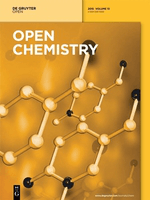
Open Chemistry
Empowering the Global Chemistry Community Through Open ResearchOpen Chemistry, published by DE GRUYTER POLAND SP Z O O, is a distinguished peer-reviewed journal that has been serving the global chemistry community since its inception. With an ISSN of 2391-5420 and an E-ISSN also of 2391-5420, this open-access journal has been accessible to researchers and practitioners alike since 2015, ensuring a wide dissemination of high-quality research findings. Located in Germany, specifically at BOGUMILA ZUGA 32A STR, 01-811 WARSAW, MAZOVIA, POLAND, Open Chemistry aims to publish innovative research across various chemical disciplines, with special attention to miscellaneous chemistry and materials chemistry. It is currently ranked in the Q3 category for both fields as of 2023, reflecting its solid standing within the academic community, with specific ranks of 187/408 in General Chemistry and 153/317 in Materials Chemistry, corresponding to respective percentiles of 54 and 51. Open Chemistry not only enhances the accessibility of cutting-edge research but also serves as a vital resource for students, professionals, and scholars seeking to advance their knowledge in the rapidly evolving landscape of chemical sciences.

Brazilian Journal of Analytical Chemistry
Catalyzing Collaboration in Analytical ChemistryBrazilian Journal of Analytical Chemistry, published by VISAO FOKKA COMMUNICATION AGENCY, serves as a vital platform for those engaged in the field of analytical chemistry, especially within the Latin American context. With an ISSN of 2179-3425 and an E-ISSN of 2179-3433, this journal aims to promote high-quality research and advancements in analytical methodologies, instrumentation, and applications spanning from 2010 to the present. Although it currently holds a Q4 rank in Analytical Chemistry by Scopus and is placed at the 24th percentile, its commitment to open access publishing provides invaluable opportunities for widespread dissemination of knowledge, catering to researchers, professionals, and students alike. The journal's editorial board comprises emerging and established experts aiming to bridge gaps in analytical chemistry research, particularly in a Brazilian and broader South American context. Situated in São Paulo, Brazil, the journal's role in fostering innovation and collaboration in analytical techniques makes it an essential resource for the academic community.

CHEMICAL PAPERS
Exploring Frontiers in Biochemistry and Materials ChemistryChemical Papers is a distinguished scientific journal published by Springer International Publishing AG, catering to the fields of Biochemistry, Chemical Engineering, and Materials Chemistry. With an ISSN of 0366-6352 and an E-ISSN of 2585-7290, this journal has been a pivotal platform for the dissemination of research findings since its inception in 1973. Over the years, it has maintained a strong academic presence, as evidenced by its Q2 and Q3 rankings in several pertinent categories as of 2023, including Chemical Engineering and Industrial and Manufacturing Engineering. Although the journal is not currently Open Access, it remains an invaluable resource for researchers and professionals across its scope, promoting the advancement of knowledge in chemical sciences and fostering innovation within the industry. The publication is headquartered in Cham, Switzerland, contributing to a global dialogue on chemical research and its applications.
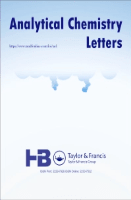
Analytical Chemistry Letters
Catalyzing Collaboration Across Scientific DisciplinesAnalytical Chemistry Letters is a notable journal published by Taylor & Francis Ltd, focusing on the interdisciplinary aspects of analytical chemistry and its applications across various fields, including materials science and forensic medicine. With an ISSN of 2229-7928 and an E-ISSN of 2230-7532, this journal provides researchers and professionals a platform to share their findings from 2011 to 2024, fostering advancements in methodologies and technologies. Despite being classified in the Q3 and Q4 category quartiles across multiple disciplines, the journal is crucial for emerging studies and discussions, particularly in the context of innovative analytical techniques and their relevance to real-world challenges. While currently not an open-access journal, its rigorous peer-review process ensures high-quality contributions that are essential for academics, professionals, and students keen on bridging theory and practice. The journal continues to build its reputation, reflected in its Scopus rankings which place it amidst a competitive landscape, encouraging growth and collaboration within the scientific community.

ACTA CHROMATOGRAPHICA
Your Gateway to Cutting-edge Chromatography StudiesACTA CHROMATOGRAPHICA is a distinguished academic journal dedicated to the field of chromatography and its applications, published by AKADEMIAI KIADO ZRT. With a history spanning from 1996 to 2024, this journal serves as a vital platform for the dissemination of innovative research and advancements within the field, contributing significantly to the body of knowledge in the domain of general chemistry. Operating out of Budapest, Hungary, ACTA CHROMATOGRAPHICA holds a Q3 ranking in the chemistry category as of 2023, reflecting its impact and relevance among its peers, achieving a Scopus ranking of 180 out of 408 in the General Chemistry category, placing it in the 56th percentile. While not currently Open Access, the journal offers robust subscription options for readers and institutions seeking to stay informed on the latest developments in chromatography. FACTA CHROMATOGRAPHICA aims to foster communication, collaboration, and discovery, making it an essential resource for researchers, professionals, and students seeking to enhance their expertise in this evolving field.

Analytical Science and Technology
Fostering collaboration and knowledge in diverse scientific fields.Analytical Science and Technology is a prominent journal dedicated to advancing the fields of analytical chemistry and technology, published by the Korean Society for Analytical Science. Based in South Korea, this journal serves as a vital platform for researchers, professionals, and students committed to exploring innovative analytical techniques and methodologies. Although it is classified under Q4 in various subject categories, including Agronomy and Crop Science, Environmental Chemistry, and Pharmacology, the journal aims to provide critical insights and contributions to the scientific community. With ISSN 1225-0163 and E-ISSN 2288-8985, it spans a converged timeline from 2019 to 2024. Despite its current standings in Scopus rankings, the journal is dedicated to improving its visibility and impact through rigorous peer review and high-quality publications, fostering knowledge sharing within its diverse academic fields. Researchers looking for a reliable outlet for their findings are encouraged to consider this journal as it continues to strive for excellence in analytical science.
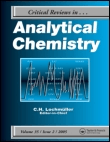
CRITICAL REVIEWS IN ANALYTICAL CHEMISTRY
Fostering Collaboration and Innovation in Analytical Research.Critical Reviews in Analytical Chemistry, published by Taylor & Francis Inc, stands as a pivotal journal in the field of analytical chemistry, contributing significantly to its advancement since its inception in 1989. With an impressive Q1 ranking in the 2023 analytical chemistry category, it positions itself among the top 15 journals in the field, reflecting its high impact and relevance, as evidenced by a 90th percentile Scopus rank. This esteemed journal is dedicated to publishing comprehensive reviews that synthesize current research and emerging methods in analytical techniques, making it an invaluable resource for researchers, professionals, and students alike. With the goal of fostering innovation and collaboration, Critical Reviews in Analytical Chemistry continues to address challenges and breakthroughs within the sphere of analytical methodologies, ensuring its authors and readers remain at the forefront of scientific discovery.

Jordan Journal of Chemistry
Shaping the Future: Pioneering Chemistry Research and Education.The Jordan Journal of Chemistry is a prominent publication dedicated to advancing the field of chemistry in Jordan and beyond. Published by the Yarmouk University Deanship of Research & Graduate Studies, this journal serves as a platform for researchers, educators, and practitioners to disseminate their findings in a variety of chemistry sub-disciplines. Although currently classified in Q4 of miscellaneous chemistry and ranking within the 9th percentile according to Scopus, the journal plays a crucial role in fostering academic dialogue and collaboration in the region. With its ISSN 1814-9111 and E-ISSN 2079-7249, the Jordan Journal of Chemistry offers open access to researchers from diverse backgrounds, ensuring that critical research is both accessible and impactful. By bridging local studies with global scientific advancements, this journal is poised to contribute significantly to the growth and recognition of chemistry as a key scientific discipline in the region, with convergence efforts set from 2020 to 2024.

ANALYTICAL AND BIOANALYTICAL CHEMISTRY
Fostering Global Collaboration in Analytical ChemistryANALYTICAL AND BIOANALYTICAL CHEMISTRY, published by SPRINGER HEIDELBERG, is a leading international journal that serves as a vital platform for innovative research in the fields of analytical and bioanalytical chemistry. With an impressive impact factor and ranking in the Q2 category for both Analytical Chemistry and Biochemistry, the journal highlights key advancements and methodologies that drive the discipline forward. Established in 1996 and continuing vigorously into 2024, it has gained significant recognition with Scopus rankings placing it in the 83rd and 78th percentiles within its categories, underscoring its impact and relevance. The journal's commitment to open access facilitates widespread dissemination of critical scientific knowledge, making it an essential resource for researchers, professionals, and students dedicated to exploring the complexities of chemical analysis. With its base in Heidelberg, Germany, ANALYTICAL AND BIOANALYTICAL CHEMISTRY continues to inspire and influence the global research community.
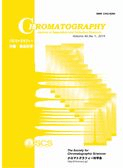
Chromatography
Pioneering techniques, bridging disciplines in chromatography.Chromatography is an esteemed journal published by the SOC CHROMATOGRAPHIC SCIENCES, dedicated to advancing the field of chromatographic techniques and their applications across various disciplines, including analytical chemistry, biochemistry, and environmental science. By facilitating the exchange of high-quality research, Chromatography plays a pivotal role in enhancing methodologies and technologies that drive innovation in sample analysis. While the journal is not currently open access, it maintains a rigorous peer-review process, ensuring the publication of valuable and impactful studies. Researchers, professionals, and students alike can benefit from its comprehensive coverage of chromatography-related advancements, making it a vital resource for anyone engaged in this dynamic area of study.